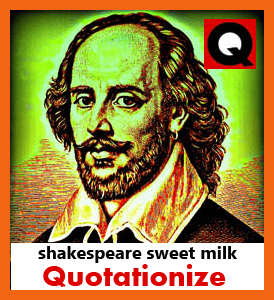Many of you have been asking what does adversity’s sweet milk philosophy to comfort thee though thou art banished mean?
Let me interpret and explain the meaning adversity’s sweet milk, philosophy.
First you have to analyze these few dialogues by Romeo and Friar Laurence in Act 3, Scene 3 of “The Tragedy Of Romeo And Juliet” written by William Shakespeare.
In this scene, Romeo has been hiding in Friar Laurence’s cell, and Friar comes home and calls out to Romeo:
Romeo, come forth. Come forth, thou fearful man.
Affliction is enamoured of thy parts,
And thou art wedded to calamity.
In other words:
Romeo, come out. Come out, you a frightened man. You are the one who is in trouble and you are bonded (wedded) to adversity (calamity).
When Romeo comes out from his hiding, Friar Laurence tells Romeo that he Romeo will be banished from Verona.
In the story, Romeo kills Juliet’s cousin Tybalt in revenge of his friend Mercutio.
Prince Escalus declares that because Romeo has killed in revenge he will be banished from the city of Verona rather than sentenced to death.
When Romeo hears that he will be banished or will be sent away for good, he feels doomed and resentful.
For Romeo to be exiled is worse than be dead.
He even despises the word “banishment” and he is hopping mad.
Then Friar Lawrence says:
Thou fond mad man, hear me a little speak.
In other words:
You foolish crazy man, listen to me for a moment.
Romeo is still enraged and sarcastically says, “Oh, you’re just going to talk about banishment again.”
Then Friar Lawrence explains:
I’ll give thee armor to keep off that word—
Adversity’s sweet milk, philosophy —
To comfort thee though thou art banishèd.
In simpler English:
I’ll give you shield to ward off from that word (banishment).
The consolation (sweet milk) for your difficulty (adversity) is philosophy.
Adversity’s Sweet Milk Philosophy Meaning
Philosophy to comfort, assuage or nurture you even though you’ve been banished.
In short, philosophy is a nourishment or relief of adversity.
Whether we agree or not, we all have heard or read the value of philosophy.
It encourages critical and systematic inquiry into fundamental questions of right and wrong, truth and falsehood, the meaning of life, and the nature of reality, knowledge and society.
Philosophy teaches us to know ourselves and to know our own limits, how to reason and how to map the limits of our ability to do so.
Sweet Milk As Philosophy Meaning
William Shakespeare used sweet milk as a figure of speech.
As we all know drinking milk is soothing and it can nourish our body and brain.
The tradition of having a glass of warm milk before bed that’s been passed down through generations, as a way to cultivate relaxation, relieve anxiety, and facilitate a more restful night’s sleep.
The Bard of Avon specifically called “philosophy” as a “sweet milk” to denote philosophy is something nourishing, nurturing or comforting to oneself.
In addition, the adjective “sweet” and not just any milk, also indicates something pleasant and delightful.
For those of you who like to know more about life philosophy, you can get this free e-book:
The Philosophy Book: Big Ideas Simply Explained
Click on any of these: Link 1, Link 2, Link 3
Pour The Sweet Milk Of Concord Into Hell Meaning
William Shakespeare again used “sweet milk” as a figure of speech in his another play, “Macbeth” in Act 4, Scene 3.
It is uttered by the character Malcolm (King Duncan’s oldest son and the heir to the throne of Scotland).
Nay, had I power, I should
Pour the sweet milk of concord into hell,
Uproar the universal peace, confound All unity on earth.
The word “concord” here means agreement or harmony between people or groups.
The word “confound” in this line means to bring to ruin, or destroy.
In other words, he is saying:
No, if I had power I would destroy world peace and end all unity on earth.
Shakespeare used the metaphor “sweet milk of concord” to enhance the word “concord” or harmony.
It is somewhat similar to the previous line from Romeo and Juliet play.
The word “sweet milk” is to signify pleasant as in harmony.
For William Shakespeare buffs, you can get the free e-book:
The Shakespeare Book: Big Ideas Simply Explained
